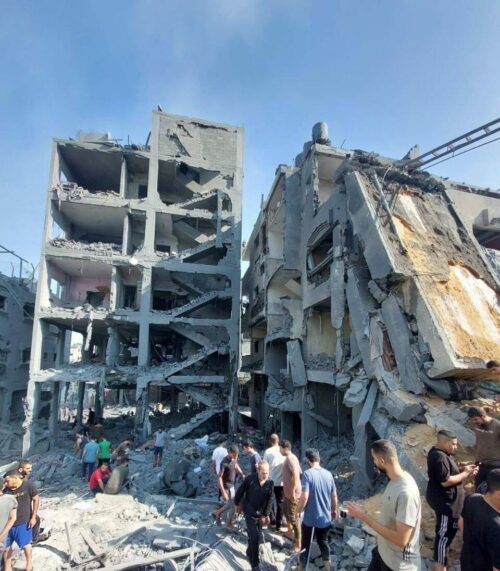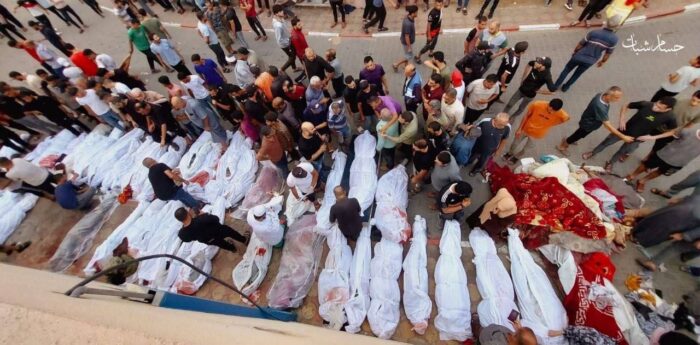Ramallah 10-31-2023 WAFA – The Ministry of Health said that the toll of slain and wounded among our people as a result of the continuing aggression on the Gaza Strip and the West Bank has risen to 8,850 and more than 24,000 wounded.
The Health Ministry added during her daily report issued today, Wednesday, that 8,720 Palestinians died in the Gaza Strip, and more than 24,000 were injured, and in the West Bank, the number of slain Palestinians rose to 130, and the wounded to 2,100 since the seventh of this October.
The Ministry stated that more than 73% of the slain Palestinians were children, women, and the elderly.
Palestinian Health Minister, Dr. Mail Al-Kaila, pointed out that the Turkish Friendship Hospital stopped working as a result of the bombing and the depletion of fuel, knowing that it is the only hospital for treating cancer patients, and Al-Shifa Medical Hospital is threatened to stop working completely within less than 24 hours.
Al-Kaila explained that doctors are still forced to perform surgeries without anesthesia, including those who were injured as a result of the bombing and women who give birth by caesarean sections, noting that during the past 24 hours, the bombing targeted health facilities, which led to the destruction of a primary health care clinic in addition to damage caused in two hospitals.
Since October 7, the occupation authorities have prevented patients from leaving the Gaza Strip for treatment in Jerusalem hospitals and within the 1948 territories, including 2,000 patients with cancer.
As of October 29, about 1,950 citizens were reported missing, including at least 1,050 children, who may be trapped or killed under the rubble waiting to be recovered.
The Health Ministry said that the Civil Defense raised the issue of the decomposition of bodies under collapsed buildings, amid limited rescue missions, which raises humanitarian and environmental concerns.
The Palestine Red Crescent Society announced that, due to the fuel shortage, it was forced to reduce the number of ambulances it operates, and all humanitarian agencies and their employees faced significant restrictions in providing humanitarian aid, as humanitarian partners cannot safely reach people in need and the warehouses in which aid supplies are stored.
The ministry added that 117,000 displaced people, in addition to medical and health personnel and thousands of patients, reside in health facilities.
She stated that there are 1.4 million citizens internally displaced in Gaza, with about 629,000 citizens living in 150 emergency shelters designated for UNRWA, where overcrowding is a growing concern, and the average number of internally displaced persons per shelter has reached 2.7 times its capacity, with the most crowded shelter reaching 11. Weak carrying capacity.

It showed that about 34,000 housing units were completely destroyed, 150,000 units were partially destroyed, 15 health facilities and 51 primary health clinics were destroyed, 221 schools were destroyed, including 38 schools completely destroyed, and 42 UNRWA facilities were destroyed, including… This includes the places where the displaced took refuge, and 7 churches and 11 mosques were damaged as a result of the bombing.
The Ministry of Health recorded 130 attacks on the health sector, where 132 health personnel were killed, more than 110 of them were injured, while 50 ambulances were damaged, including 28 that were completely out of work, and 16 out of 35 hospitals in the Gaza Strip were closed, and 51 out of 72 centers were closed. Primary health care due to damage caused by bombing or fuel shortages. 24 hospitals in the northern Gaza Strip were asked to evacuate (the total capacity of these hospitals is 2,000 beds).
55% of health sector partners have suspended their operations due to significant damage to infrastructure, forcing hospitals to operate with less than a third of what is needed to treat the large number of wounded, and hospitals are still suffering from a severe fuel shortage, leading to strict rationing and limited use of electricity generators for basic functions only.
The Ministry indicated that maintaining and repairing standby generators, which were not originally intended for continuous operation, is becoming increasingly difficult due to the scarcity of spare parts, which seriously affects the most important functions in hospitals and the ability of ambulances to respond.
She noted the possibility of stopping newborn incubators, pointing out that there are 350,000 patients with non-communicable diseases, and 1,000 patients in need of dialysis, as 80% of dialysis machines are in hospitals in northern Gaza.
Updated: Israeli Missiles, Shells, Kill Hundreds Of Palestinians In Gaza
Israeli Missiles And Shells Kill Dozens Of Palestinians, Injure Hundreds, In Gaza
Israeli Missiles Kill Dozens Of Palestinian Civilians In Gaza
Israeli Missiles Kill Dozens Of Palestinians In Gaza
Updated: Israel Intensifies Its Bombing Of Gaza

